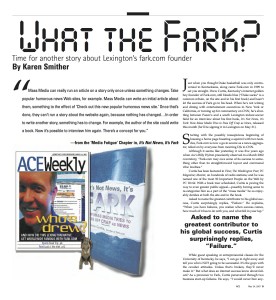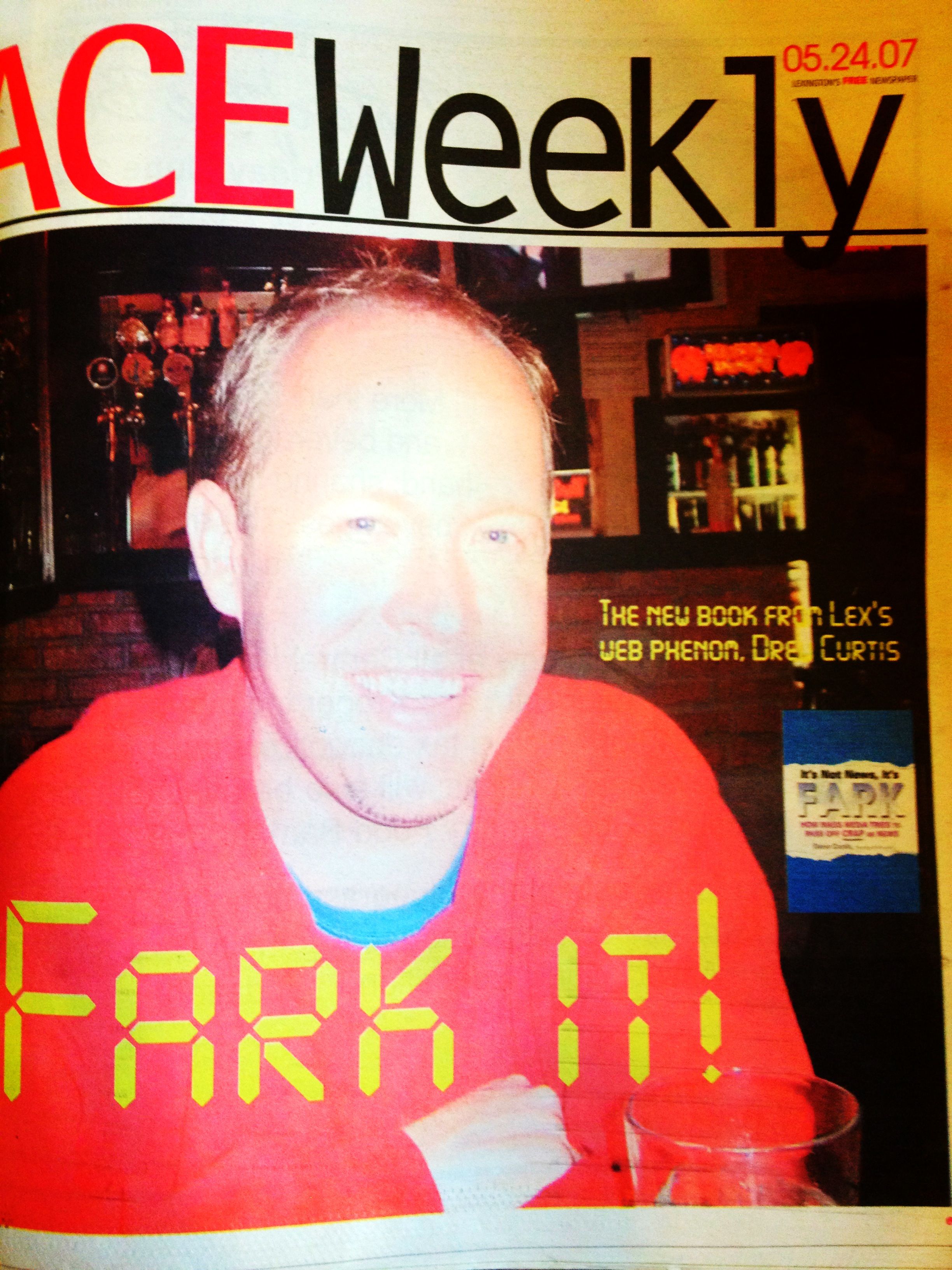Click here to view a PDF version of this article
By Karen Smither


Starting with the possibly inauspicious beginning of housing a home page boasting a squirrel with two testicles, Fark.com is now a go-to source as a news-aggregator, relied on by everyone from morning DJs to CNN. Although it seems like yesterday, it was five years ago when Ace’s Billy Hylton presciently observed in a March 2002 coverstory, “Fark.com may owe some of its success to something other than its straightforward layout and communal vibe: boobies.”
Curtis has been featured in Time; The Washington Post; PC Magazine; Maxim; on hundreds of radio stations; and he was named one of the most 50 Important People on the Web by PC World. With a book tour scheduled, Curtis is paving the way to even greater public appeal—possibly forcing some to re-categorize him as a part of the “mass media” he so enjoyably derides at both the site and in the book.
Asked to name the greatest contributor to his global success, Curtis surprisingly replies, “Failure.” He explains, “When you have failures, you realize when success comes, how much of it has to do with you, and what fell in your lap.”


The new book is sorted into self-explanatory chapters, helpfully titled, Media Fearmongering; Unpaid Placement Masquerading as Actual Article; Equal Time for Nutjobs; the Out-of-Context Celebrity Comment; Media Fatigue etc. Of course, he acknowledges there’s ample opportunity for overlap.
The results were that Rhode Island has the dumbest drivers. To me, this was an unusual result because having grown up in and being a current resident of the state of Kentucky, I’ve come to expect that any study involving a state-by-state ranking on how stupid or fat Americans are will have southern states all clustered at the bottom. But not this time. Suck it, Rhode Island.
—from the “Unpaid Placement Masquerading as Actual Article,” chapter in, It’s Not News, It’s Fark.
When asked if the pop culture world is surprised that Fark’s home office is in Kentucky, Curtis replies, “At first they’re a little taken off guard. Then they stop and think, ‘Hey, it’s the internet. You can do that anywhere.’”
He adds, “Living in Kentucky you get an outsider’s perspective of what’s going on in the media.


says Homeland Security Department.” Curtis writes by way of follow-up to a paragraph in the Kentucky Post, “I can’t imagine the horror of being a journalist and getting handed this assignment.”
Postings that followed the tagline included, “The people of Kentucky have nothing to worry about unless the terrorists give STDs to the sheep.”The state officials in charge of the drill later passed on a message to Curtis, via a friend, along the lines of “Thanks a lot.” Stephen King’s jacket blurb reads, “I laughed so hard I almost threw up. Readers who want to know where that happened need to buy this book and read the item about Homeland Security and goats.”
“Just because a number of people believe something doesn’t make it a legitimate alternative viewpoint.”
—from the “Equal Time for Nutjobs” chapter, in It’s Not News, It’s Fark
Responding to questions about any political affiliations the site might have, Curtis claims Fark to be “twenty-six percent liberal, twenty-four percent conservative, and fifty percent neutral or hating everybody,” he says with a laugh.
In the wake of Janet Jackson Nipple-Gate, in the Media Fatigue chapter, he quotes Farker, SmiteTheRighteous as complaining, “a bared breast on national television, America screams and the FCC demands an investigation the next day. Faulty wartime intelligence and you have to practically bribe your government to get them to investigate.”
In the chapter devoted to “Equal Time for Nutjobs,” Curtis takes on everything from conspiracy theories to urban legends. Writing about a 9/11 conspiracy [tagline: Nutjob
skeptics doubt new 9/11 pentagon footage, say missile was visible in frame No. 3] he describes “the real bafflement” as to “why the media even gives these guys coverage. Compare the two viewpoints. On the one hand we have thousands upon thousands of hours of forensic science, intelligence gathering, and contemporary media. On the other, we have none of these. The two viewpoints are not equally valid.”
In his response to an article that called the video a “charade” Curtis writes with flammable candor of the ‘expert’ consulted, “First off, they should just automatically confer the honorary title of ‘nutjob’ when you get your Ph.D. in philosophy, because you have to be insane to think you can do anything with a philosophy degree. Secondly, University of Minnesota Duluth is a sucky school. This is the best job this guy could get. Credentials indeed.”
“Everyone claims to want real news, but no one really does. The great unwashed masses want the titillation Mass Media provides. The masses would rather read about crap than news.”
—from the chapter “Epilogue: What Mass Media Should Be Doing” in It’s Not News, It’s Fark
Today, Curtis lives with his wife, Heather, and their two children, Storm and Chance, here in Lexington. They live in a modest home, in a bucolic setting adjacent to a local horse farm.
In the final chapter of the book, he writes, “If I had to sum up the state of the world today, I would say that certainly things are bad, but not really any worse than they ever have been.” But he follows that with the admission, “Not very many people believe me on this point,” adding, “No one wants to read a news article entitled ‘Things Are Not All That Bad,’ (a book that I’ve wanted to write but which would never in a million years sell well).
Fark’s revenue is generated through advertising dollars on a paid per page views bases. Securing advertising revenue while going after even bigger advertising fish, Kentucky’s low cost of living aids Fark’s success. “Kentucky is a lot cheaper than living in Silicon Valley. Instead of a thousand plus mortgage, I only pay $800 a month.”
In predicting the imminent demise of Mass Media in the final chapter of the book, he writes fondly of a Louisville restaurant review site manned by a former Courier Journal critic, suggesting “The Courier-Journal might as well mothball their own local restaurant critic as far as I’m concerned…”
Of the proliferation of local Mass Media outlets who want to survive, he says, “If I were local Mass Media, I’d start taking out hits on, or more realistically, buying the guys
doing facets of local news better than me before they ran me out of business. I’m talking about the local independent weeklies, bloggers…Just the good ones, not all of them.” He cites the Boston Globe’s acquisition of BostonDirtDogs.com as a successful example of “all of the traffic, none of the responsibility.”
Still, the book ends with a segment on the tagline “Man who stapled his penis to a cross and set it on fire in a bar bet says he couldn’t be more thrilled to have received an honorary Darwin award.”—making it seem pleasantly unlikely that Fark.com will ever be “brought to you by Gannett.” And if this book sells well, maybe he will finally get the opportunity to write one titled Things Are Not All That Bad. ■
Drew Curtis, will be kicking off his national book tour for IT’S NOT NEWS, IT’S FARK: How Mass Media Tries to Pass Off Crap as News at Joseph-Beth Booksellers at 7pm, May 31.
—
It’s Not News It’s Fark
“Remember when MTV use to be music. Before long we’ll be saying, remember when CNN use to be news.”
—Drew Curtis, Fark.com founder.
The blurbs on Drew Curtis’s new book, It’s Not News, It’s Fark, come from Stephen King, Dave Barry, The Smoking Gun, Fox News, and CNN.


Spears not wearing underwear.”)
As Curtis writes in the opening chapter “Fark.com isn’t a weblog. Mass Media has categorized Fark.com as a blog, but it’s not. The word weblog seems to have been defined by Mass Media as anything news-related that is not Mass Media. If you asked them, they’d tell you a Weblog was everything from sites actually producing news commentary to guys in their pajamas talking about what they ate for dinner.”
So, that’s what it’s not—it’s not guys in their pajamas writing menus.
As for what it is, Curtis writes, “Fark.com, the web site, is a news aggregator, an edited community-driven news site.”
The site receives “2,000 or so news submissions from its readership” daily, and Curtis goes over them to decide what to post. Criteria? He writes, “usually, this is based on how funny the submitted tagline is more that anything else. The tagline is essentially the article headline rewritten into a one-line joke by the submitter.”
A bulletin board located next to each link allows visitors to post commentary on the articles.
Some of those are collected in the book. For example, within a discussion thread on the “phenomenon” of CyberMonday (which, as it turns out, is not a phenomenon at all, and falls within the chapter of “Seasonal Articles”), a poster with the
screen name “Most Delicious Worm” says, “On Cyber Monday I bought porn subscriptions for all my loved ones. Except my cousin Amber, who’s already got her own line of videos.”
“Swanky Wanky” posts, “This year people will be able to buy gifts over the internet, or ‘online’ as technology buffs like to call it.”
One tagline, included in the Media Fatigue chapter, reads “Cheney’s Got a Gun: Days in Mass Media: 8.” Curtis writes in follow-up, “If you ever want to see some drunk-ass politicians, stop by the Frankfort Holiday Inn in the evening sometime [when] the Kentucky legislature is in session. It reminds me of the old Looney Tunes cartoons about Sam Sheepdog and Ralph Wolf, where they go to work every morning, chatting about random stuff, but once they clock in, it’s on. They fight all morning, take a lunch break together, fight all afternoon. That’s government folks.”
Much of the commentary highlighted in the book (a book that is far more comprehensive than the “best of fark” collection Curtis was encouraged to write) is cogent and concise, and covers everyday and controversial subjects alike (i.e. politics, religion, Duke basketball). ■
[amazon asin=1592403662&template=iframe image&chan=default]











